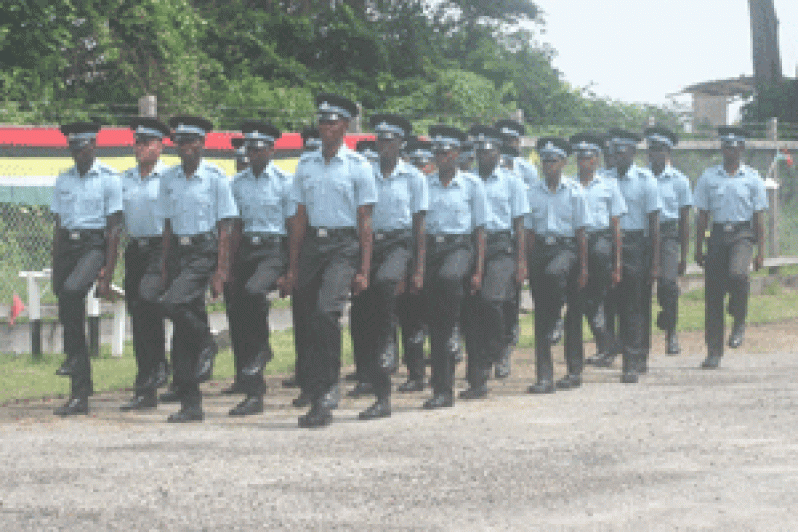THE maintenance of peace and order in any country remains of paramount importance, and in Guyana, the Administration annually allocates huge amounts of resources for training of its security personnel, in order that they carry out their mandate effectively.  A 27- member batch is the latest to benefit from training opportunities after completing several months of training at the rehabilitated Richard Faikall Police College in Essequibo, Region 2.
A 27- member batch is the latest to benefit from training opportunities after completing several months of training at the rehabilitated Richard Faikall Police College in Essequibo, Region 2.
Speaking at the graduation ceremony, Minister of Home Affairs, Clement Rohee, urged the ranks to perform their functions in accordance with the laws of Guyana, while working to forge closer collaboration with community members, since their involvement and support are critical to the success of the police in preventing crime and apprehending offenders.
“You are the ones that will be interacting with ordinary citizens of our country. Negative and positive perceptions of the Force could be drawn from these engagements, as your conduct will be under scrutiny by the public at all times… it is part of your duty to enhance the relationship between the police and the public, you should at all times strive to create a good image of yourselves to the public, both on and off duty,” Minister Rohee urged.
In preparation for the challenges that lie ahead of them, he said that the Police Force, as a matter of necessity, has provided them with adequate and appropriate skills and training. “One of the important reasons you must be exposed to a high level of training is due to the fact that, as constables patrolling the streets either by foot, bicycle or motor vehicles, you will be faced with situations where you have to make decisions in split seconds, without being able to make references to your supervisors, in some instances,” Minister Rohee explained.
Government, he said, is supportive of the move taken to de-centralise its recruitment and training programmes as it will bring significant benefits to the Force.
These include more persons from the outlying regions being given the opportunity to join the Force, the cost of training could be reduced, the peculiar circumstances of communities located away from the city could be better understood, and the regional training facilities will be used for advanced and refresher training for police ranks, neighbourhood police, and members of the rural constabulary and community policing groups (CPGs).
Against this background, he said the environment under which the Force is operating has been changing rapidly, and the organisation has been reviewing its operations to meet the new challenges. One of the new initiatives, Minister Rohee said, is greater appreciation for technological advancements which have resulted in better management of information and data collection, thus keeping the Force ahead of crimes.
One of the new initiatives, Minister Rohee said, is greater appreciation for technological advancements which have resulted in better management of information and data collection, thus keeping the Force ahead of crimes.
Regional Chairman, Region 2, Parmanand Persaud, and other senior officers, including Police Commissioner (ag) Leroy Brumell, also congratulated the new ranks on completing their training.
The batch was schooled in several key areas, including information technology, traffic control and policing, during the course that began in July, 2011.
The new officers will be on probation for two years, after which they will, if they remain in the Force, be brought back to the college for final training which will enable them to be classified as police constables.
In 2001, then Police Commissioner Laurie Lewis dedicated the college in honour of Sergeant 11117, Richard Faikall, who tragically lost his life in the line of duty in 1997.
Government, with support from the private sector, undertook to rehabilitate the facility to improve its operational capacity and it was re-commissioned in September 2011. (GINA)
Richard Faikall Police College graduates 27 more
SHARE THIS ARTICLE :
Facebook
Twitter
WhatsApp


.jpg)











